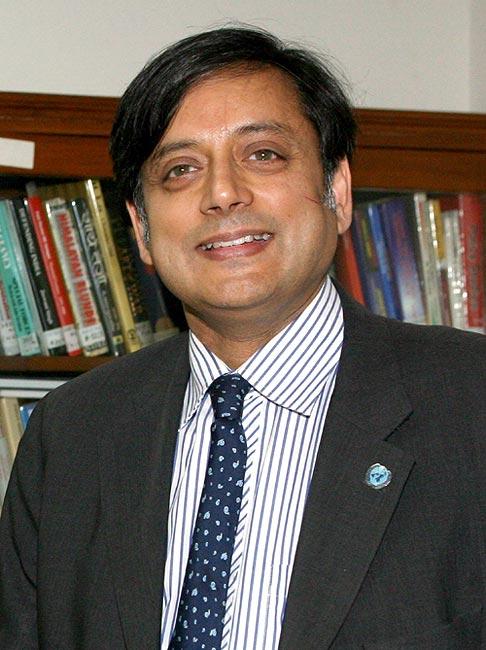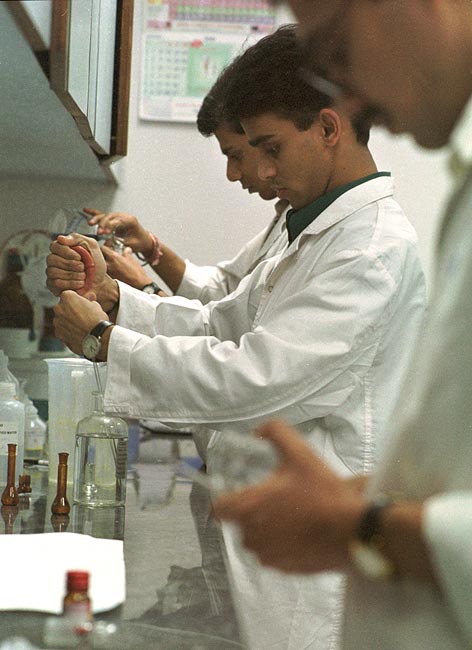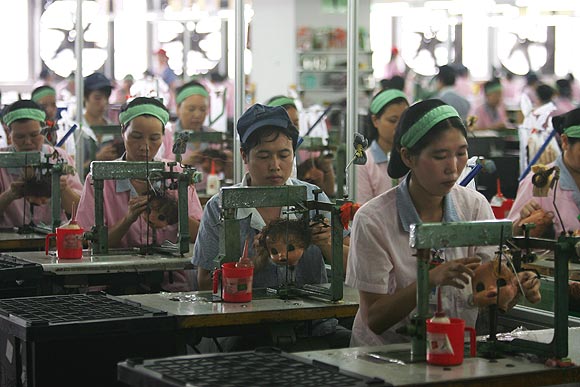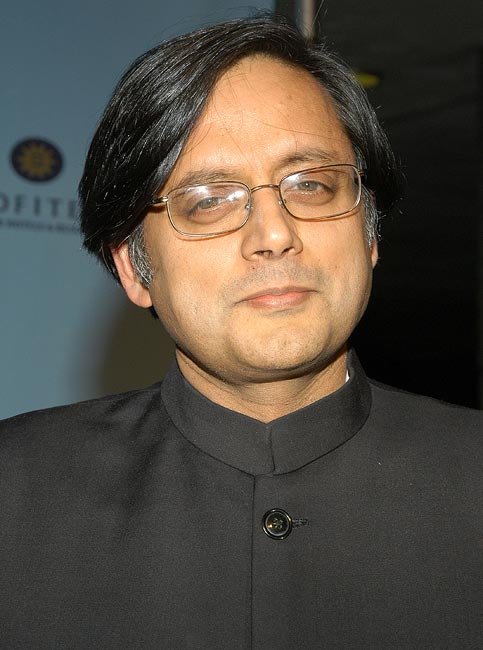Photographs: B Mathur/Reuters Shobha Warrier
Shashi Tharoor, the suave Member of Parliament from Thiruvananthapuram, has been named minister of state for human resources development in the recent ministerial reshuffle.
When more than half of India's population is below the age of 25, his ministry assumes great significance, and in this exclusive interview with Shobha Warrier in Thiruvananthapuram, he outlines his plans for the young in India.
More than six decades after independence, we have children dropping out of school at the primary school level and some not going to school at all. How do you plan to solve this problem?
We are solving it. First of all, the Right to Education Act makes it a constitutional right of every child to get education from age 6 to 14. In the old days, if the child was not in school, the parents were accountable but today, it's the state's responsibility and courts can actually take the states to task if a child is not in school. The onus has shifted, which is a healthy development.
Secondly, we are funding this kind of education heavily. Sarva Shiksha Abhiyan has funnelled thousands of crores of rupees to state governments in order to strengthen the school education system.
Still, children do drop out of school...
Yes, there is a drop out at class 5 and class 8 levels in the government schools in rural areas. Particularly in northern India, you find figures as high as 50 per cent. It is very worrying.
'We still don't have proper buildings, lack of proper training to teachers, absenteeism of teachers'
Photographs: Wikimedia Commons
Is it not because of poverty that they are dropping out?
It is a combination of factors. The socio-economic factors are very much there like there is pressure on boy children to contribute to the family by working in the fields or pressure on girl children to take care of siblings and do household chores. So, the pressure within the family is a major factor particularly if the parents are uneducated.
The second challenge is that the systems are still not perfect like we still don't have proper buildings, lack of proper training to teachers, absenteeism of teachers, etc. We are taking care of all issues including better salaries for teachers, constructing proper classrooms, etc.
Which is more challenging, the problems in primary education or higher education?
There are problems across the board. If you look at the primary education system, enrollment has gone up after the Right to Education Act. In India, 18 per cent benefit from the higher education while the global average is 28-29. So 18 is a bit low.
We have an interesting dilemma from the 1940s. On the one hand, inclusion and expansion are very important. In the 1951 census, we had less than 17 per cent literacy. So, the vast majority of the country was illiterate. We had 30 odd universities and a few hundred colleges. Today, we have 670 universities and 30 odd thousand colleges. Yes, the population also has grown.
'The next generation story is the story of quality'
Photographs: Alyssa Banta/Newsmakers/Getty Images
But there is a general complaint about the quality of the institutions and students...
Yes, in the process, quality got affected and that is a big worry. While expansion, equity and inclusion are fundamental in a democracy, it cannot be completely sacrificing quality. We have woken up to this seriously.
Of course, there are some good quality education institutions in India but they form a small elite sliver on top of a complete ocean of mediocrity. We want to create more institutions of excellence.
When compared to the top institutions in the world, even the IITs are also not ranked at par with them...
That is a bit unfair. We don't figure in the various global rankings in the top 200 or 300. But that is because a significant percentage of the ranking weightage is given to research. But our institutions are teaching institutions and research is done in specific labs and specific places. So, in a place like the IIT, hardly any research takes place.
I remember when I went abroad in 1975 to study in America, I was a liberal arts student and it was well known there that even the last ranked student from an IIT was given a scholarship there. The one who came first may go to MIT or Caltech or Harvard and the one who came last also got full scholarship in some other university because the last from the IIT was better than the best in many American universities. That's how good our elite institutions are.
Of course, we have to strengthen research and we are financing more and more innovation centres in 11 of our campuses including the IITs. We are creating, under a new bill, 14 universities for innovation, which would be principally research universities. The bill is to be passed by Parliament.
We are also creating collaborations among universities. As an experiment, we are creating a meta-university concept in Delhi with collaborations among four universities to jointly conduct programmes of studies. For example you can take courses in Jamia Milia, Delhi Univesity and JNU. We can do this not just in one geographical area but in various states. That could be the future.
The next generation story is the story of quality. I would be very surprised in the next 10 to 15 years, if we don't have universities in the top 200!
'Employers are trying to make up for the deficiencies of the college studies'
Photographs: Wikimedia Commons
What about the next rung of universities? For example, thousands of engineers are recruited from such institutions and the complaint of the industry is that they are unemployable and need to be educated again. What do you say about this?
You are right. I have spoken to many CEOs and they have told me that these students are unemployable and have to be re-educated not just on the job training but a year of work to make up for the deficiencies in the college education. That is why TCS has a campus here in Thiruvananthapuram and Infosys has a campus in Mysore, etc. They are like universities.
There is no doubt that many employers are trying to make up for the deficiencies of the college studies.
There are a couple of things we need to do. One is, we need to have much more interface between the industry and the academia. Industry can tell the colleges what they want so that academia can make amends in their teaching.
Everybody has been talking about this collaboration between the industry and the academia for more than a decade but not much has happened till now.
It is happening now. There are more and more collaborations organised. The Narayana Murthy Committee on Higher Education has come up with a particular set of recommendations which we intend to follow.
I would even welcome more private industries coming up and setting up universities of their own if they want to, in the university space. Right now, TCS and Infosys are doing education in the form of training.
Other than the centres of excellence, even the average institutions may have centres of excellence in one subject which we would like to encourage. For example, an otherwise ordinary university in a rural area may have an excellent department in agriculture. The important thing is to have quality.
The percentage of GDP given to education may be low by global standards, but we have the political will to raise that.
'Unemployed, uneducated men fall prey to the blandishment of the gun'
Image: Naxals with their weaponsPhotographs: Rediff Archives
Now that you have taken charge of the HRD ministry, with more than half the population in India under the age of 30, there are a lot of expectations from you. How do you plan to meet them?
Young people can be assured that we have a young team in the ministry. We are all open to new ideas and suggestions and proposals. We are conscious that Parliament has only a year and quarter left, so we can lay a platform for further excellence.
What about the high unemployment rate?
I have often argued that with 540 million Indians under the age of 25, with further 225 million between the age of 10 and 19, we have the potential to be the work force of the world. We will be a dynamic youthful productive population at a time when the rest of the world is ageing. In China, the average age is 37, while in India it's 27.
In the next 10 to 12 years, it will be 50 for China while it will be still 25 to 26 for us. So, we have the amazing ability to work for ourselves and for the world. But that will only succeed if we educate these people.
Can unemployment not result in disaster?
Yes, if we get it wrong, that is, if we are not able to educate, if we are not able to give training, can you imagine what the horrors are? What are Maoists? Maoists and Naxalites are young unemployed men, frustrated with no real hope in the system. Because they have no qualifications to take advantage of what the system is offering. Such men are prey to the blandishment of the gun. That is the nightmare we have to avoid.
'When Chinese wages go up, India will once again be competitive'
Image: Workers assemble dolls at the production line of Jetta (China) Industries Co., Ltd.Photographs: Feng Li/Getty Images
When you are automating more and more things, is it not harder to generate employment?
It will be harder but we have an enormous shortfall in skilled manual labour. For 3,000 years, if you wanted to be a cobbler or carpenter, the professional knowledge was passed through the gene pool, not professional institutions. These are all functions that are needed in our society. We can improve it through vocational training.
Then, you have tremendous scope for growth in manufacturing. It is slowly happening, like Tamil Nadu is creating its own Detroit but we should be doing much more in this.
When Chinese wages go up, India will once again be competitive.
When our wages rise, it may move to some other destination too in this globalised world...
Yes, it can also happen. There is no easy answer to your question. It is foolish for me to say, 'no we will be able to withstand that'. For a long time, China had only very basic level of manufacturing but they became the leaders by making the labour skilled.
We are not the only game into manufacturing. In the 1960s, had we allowed all these people to come in, it would have been different. Unfortunately, we had a protectionist policy. Today, if we allow companies to set up here, we will be competing with China, Vietnam, Indonesia, etc.
'There is no question that we need to retain English'
Image: Minsiter of HRD Shashi Tharoor's file imagePhotographs: Lawrence Lucier/Getty Images
Are you worried about India becoming a centre for services, ignoring manufacturing?
Services also are very important. It is a great asset and we need to continue. Yes, we need to do something more in manufacturing. We need to have both manufacturing and services.
We certainly have strengths in tourism. Comparing every dollar invested in tourism with every dollar invested in industry, you create nine times more jobs in tourism where you can hire semi skilled and unskilled labour. We can encourage tourism as it will be a major employment source.
There was a plan to move away from teaching English in many parts of India. How important is knowledge of English in exploiting the employment opportunities?
It is a very useful accident of history that we were left with English and obviously it is essential to try and retain it. Many today see English education as a ticket to the future. There is no question that we need to retain English. I am very much for doing that in this increasingly globalised world.








Comment
article